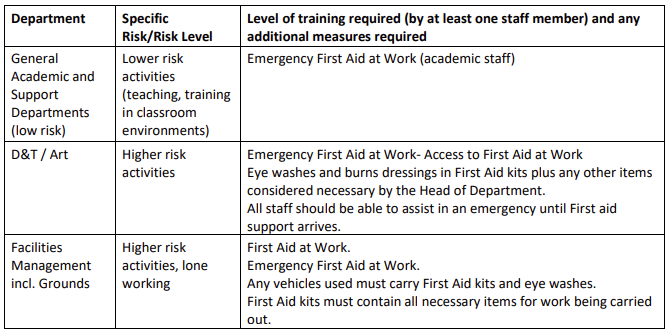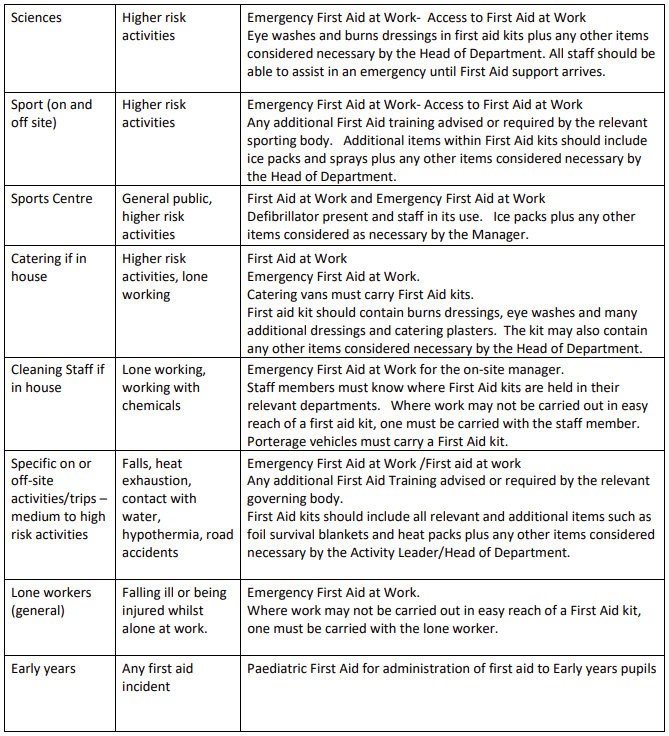1.1 The purpose of this policy is to ensure that appropriate First Aid arrangements are in place for pupils, staff and any visitors to Lime Hills Academy. This includes providing sufficiently trained employees for our business needs both on and off site and maintaining an adequate supply of First Aid equipment. This includes having a paediatric first aid trained member of staff available whenever early years pupils are on site, also covering before and after school activities.
1.2 The Academy will provide sufficient information to staff to enable First Aid assistance to be sought during normal working hours. Where work is regularly undertaken outside these hours, then adequate First Aid cover will be provided.
1.3 It should be considered in line with our Safeguarding Policy, Health and Safety Policies, Administering of Medicines policy, and Infection Control procedures and risk assessment
2.1 The Cabot Learning Federation (CLF) is required to report any serious injuries, accidents, dangerous occurrences or diseases to the Health and Safety Executive (HSE) under the Reporting of Injuries, Diseases and Dangerous Occurrences Regulations 2013 (RIDDOR). Riddor accidents must be reported to the HSE within 10 days of the accident, or within 15 days for over 7 day absence injuries (Staff). Under these regulations the federation must report the following:
2.2 Definition of a RIDDOR reportable major Injury are:
RIDDOR reporting is undertaken by Head of Health and Safety on behalf of the CLF
2.3 The federation’s duty to provide First Aid at work is governed by the Health and Safety (First Aid) Regulations 1981 (amended 2024). These require each academy to carry out a risk assessment in order to determine what First Aid facilities and personnel are necessary to meet the needs of the business. The academy is also required to review this assessment periodically to ensure that current provision is adequate. In order to comply with these regulations, the academy’s assessment has considered a number of factors, including the following:
3.1 The Academy has assessed the risk in each department or for each activity as follows:


4.1 The HSE has not set out how many First Aiders are needed in an academy; but it does provide guidance about how to assess what is needed. First Aid provision must be ‘adequate and appropriate in the circumstances. Each academy must provide sufficient First Aid equipment, facilities and personnel at all times.
4.2 Each academy must carry out a First Aid needs assessment which considers the environment, numbers of people that may be present and any hazards and risks that may occur. The findings should be used to determine what First Aid arrangements are put in place. (A model is available on CLiF)
4.3 Particular thought should be given to what will happen outside of normal operating hours, consideration of lone workers, contractors on site and to any events being run, such as open evenings.
4.4 Academies should contact a member of the Health and Safety team for further advice about appointing and training First Aiders.
5.1 The duties and responsibilities of First Aid Personnel are outlined below.
5.2 First Aiders (trained in either Emergency Aid or First Aid at Work) are responsible for:
When a pupil has been injured or been involved in an accident, Lime Hills Academy will be responsible for informing parents, carer by telephone or e-mail.
5.3 Appointed Persons are responsible for:
6.1 The following are general first aid related procedures to be followed by all staff:
6.2
7.1 It is the federation’s policy to offer First Aid assistance to visitors to our premises. Should a visitor feel unwell or have an accident, then the employee supervising their visit should call for a First Aider. If the visitor has had an accident, the employee dealing with the incident is responsible for ensuring that an accident/incident report is completed and logged with the Operations Manager, Principal or Vice Principal and that the first aider enters the incident onto the CLF Accident reporting forms.
8.1 All staff undertaking first aid duties on behalf of the academy will be given full training in accordance with current legal requirements. The federation will additionally train academic staff in emergency first aid subjects which they are likely to be exposed to when administering first aid to pupils. Staff training in the use of the Epipen and how to respond to other particular medical needs (e.g., asthma, diabetes) will also be provided. No training will be considered complete unless the course is attended from start to finish and the trainer considers the attendee to be competent following the course completion.
8.2 First Aiders will receive the First Aid at Work course (3 day course). These persons can be called upon to attend staff, pupils and visitors to the academy.
8.3 Emergency First Aiders will receive the Emergency First Aid at Work course (1 day course). The federation has identified this course as an extremely useful course for support staff who deal with general First Aid demands and for lone workers.
8.4 A moderate number of non-teaching staff within departments will be trained to this level and then receive retraining at 3-year intervals. (Based on your academy risk assessment), Paediatric First Aid training will be provided for staff in early years setting (2 day course); staff will be retrained every 3 years. There is a requirement for a paediatric first aider to be on site whenever pupils aged 5 and under are present including before and after school activities.
8.5 Administration of Medicine training will be provided for identified staff who support students with medical needs/administer medications (half day course); this should be refreshed every 3 years. Please refer to separate Supporting pupils with medical needs policy.
8.6 All First Aid training will be delivered by a suitably qualified individual. Where necessary, all line managers will be expected to re-organise working hours to enable staff to attend training. The academy will do its best to ensure that sufficient notice of both initial training courses and any refreshers are given to managers to assist with this planning.
8.7 Staff who administer First Aid according to their training in the course of their employment, will be covered by CLF Employer’s liability insurance.
9.1 There is no standard list of items to be held in a First Aid kit, although there is an HSE/BS standard guidance which can be followed if suitable.
9.2 The choice and number of items in the kit need to be suitable for the risks in each department. The table beginning on the first page of this policy shows the basic risk assessment for First Aid within the academy, however, additional risks should be identified by individual departmental risk assessments and this should be used to guide the choice of contents.
9.3 As a basic guide and where there is no special risk, the minimum stock of First Aid items in a low risk department (as advised by the HSE) would be:
9.4 Dependent upon the department type and risks associated, each department could also consider including the following:
Tablets or medicines should never be kept in a first aid kit.
9.5 A spills kit (suitable for dealing with bodily fluid spills) should also be available at each academy, and within high risk departments. This should be located adjacent to the First Aid kit.
9.6 Eye washes are not routinely kept in or near to a First Aid kit but should be used whenever a risk to eye health is present and a mains water tap is not or might not be in the immediate vicinity (in the event of mobile working). Wherever eye risks are present away from a tap, an eye wash should be provided.
9.7 Department heads, the Operations Manager or the Health and Safety Advisor need to assess if the above list is suitable for specific areas for the risks posed by any activity or area. First Aiders are encouraged to attach a list to the outside of each First Aid kit that details the contents and the expiry date (if applicable) for each item. First Aiders should also check their First Aid kit regularly to ensure that sufficient items are available and within the use by date.
9.8 First Aid kits need to be sited to ensure that they are available out of ‘normal’ hours for anyone who needs to use them. First Aid kits should also be located as close as possible to hand washing facilities.
10.1 All CLF academies will hold at least one defibrillator onsite. The academies defibrillator/s are
located at the front Foyer of the WHA site, Beaufighter Road, WSM and in the school office at
the Nailsea site, Pount Lane, Nailsea.
10.2 As per the manufacturer’s guidance, each defibrillator will have regular checks completed by an
appointed person. This will include an inspection of the battery and the pads
10.3 From December 31st 2016, defibrillator training is part of both the First Aid at Work and
the Emergency First Aid at Work courses.
10.3 It is important that all first aiders make themselves fully aware of the location and use of the
Academy AED unit
11.1 Suitable accommodation should be provided in order to cater for the medical and therapy needs
of pupils, including— (a) accommodation for the medical examination and treatment of pupils;
(b) accommodation for the short-term care of sick and injured pupils, which includes a washing
facility, hot and cold running water and is near to a toilet facility. Good standards of
housekeeping and hygiene are maintained; and (c) where a school caters for pupils with
complex needs, additional medical accommodation which caters for those needs.
11.2 The room does not need to be used solely for this purpose but an identified area compliant with
11.1 above.
12.1 The federation acknowledges that First Aid arrangements will only operate efficiently where
they are understood by both employees and others who may be working on academy
premises. These include part-time and temporary staff. For this reason, information on how
to summon First Aid is provided for all new staff at induction. A list of the First Aid at Work
qualified first aiders can be found in the main school office in both school sites (BR & Nailsea).
12.2 A list of First Aiders is attached as Annex 1.
These persons have the levels of first aid as detailed. We have 2 First Aid at Work qualified staff
members, and they are trained to deal with any first aid emergency for School staff, pupils or
visitors:
Lisa Emslie expires 4/5/26
Clare Hughes expires 17/3/28
Lidea Barton expires 6/9/25
Clara White expires 6/9/25
Lynn Ovens expires 25/09/26
Lis Jolley expires 6/9/25
Ellie Street expires 6/9/25
Joe Thomas expires 6/9/27
Dominic Marshall expires 22/4/27
Owen Wolfe expires 3/9/27
Natalie Sweet expires 3/9/27
Asha Banjoko expires 3/9/27
Zoe Jenkins expires 3/9/27
Alex Carmichael expires 3/9/27
Tessa Fayers expires 3/9/27
Mali O’Doherty expires 3/9/27
Holly Lewis expires 3/9/27
Jadwiga Skowron expires 3/9/27
Clare Hughes expires 10/9/27
Claire Speight expires 3/9/27
Laura Begley expires 3/9/27
Sophie Price expires 3/9/27
Melody Brain expires 3/9/27
Marnie Swarbrick expires 11/9/27
Lidea Barton expires 27/9/25
Lisa Emslie expires 11/02/27
Lis Jolley expires 23/10/26
Ellie Street expires 18/9/26
Joe Thomas expires 14/5/27
Lynn Ovens expires 26/10/27
Zoe Jenkins expires 25/3/27
Clare Hughes expires 14/10/27
Alex Youde expires 29/1/28
Laura Begley expires 12/11/27
Riannon Love expires 16/11/27
